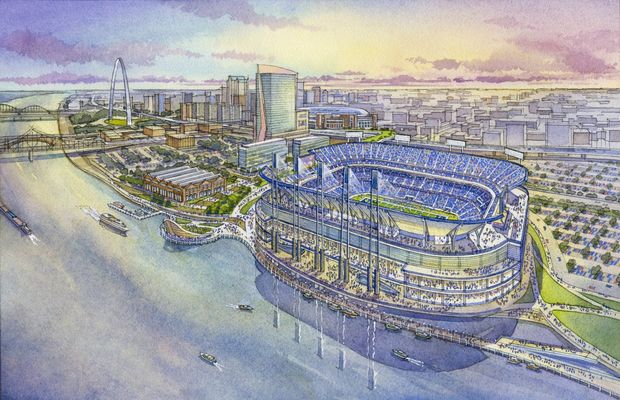JEFFERSON CITY, Mo. — Several state lawmakers have signed on to a lawsuit looking to block expanding existing state bonds to build a proposed NFL stadium on the St. Louis riverfront.
Sen. Rob Schaaf, R-St. Joseph, is leading the suit, and has bipartisan co-plaintiffs including Rep. Rob Vescovo, Rep. Jay Barnes, Rep. Mark Parkison, Rep. Eric Burlison and Rep. Tracy McCreery.
Schaaf and his colleagues take issue with the move by Gov. Jay Nixon to expand and extend bonds originally meant to build and maintain the existing Edward Jones Dome where the Rams currently play. The Regional Convention and Sports Complex Authority (RSA) manages oversight of the facility.
The new stadium is estimated to cost roughly $985 million, with Nixon’s own task force saying that about $250 million will need to come from both the city and state to foot the bill. The debate has now been focused on whether hundreds of millions can be spent on the project without approval of the voters.
Nixon has contended that no such vote is needed and that his office has the authority to extend the existing Dome bonds. Legislators have disagreed, and earlier this spring, offered several bills prohibiting any new stadium bonds without placing the issue on the ballot.
The current statute which created the RSA appears to clash with the stated plans to build a new stadium. Extending bonds would increase the amount on the principle owned, something clearly prohibited in the law. The existing RSA law also prohibits bonds extending longer than 50 years and mandates that any stadium be built adjacent to an existing convention center.
“What the money is being spent on is irrelevant,” Parkinson said. “What is relevant is that the governor needs to follow the law.”
The lawsuit represents yet another barrier to the billion-dollar project that both Nixon and St. Louis Mayor Francis Slay have identified as a top priority. If a Cole County judge agrees with the plaintiff’s interpretation of various parts of state law, it will represent a significant blow to the new venue. In order to build a new stadium without triggering another challenge, lawmakers and Nixon would have to create a new stadium authority public body, write new specifications for the project into law and authorize new bonds by a ballot vote of the people.
Nixon will need a resounding win in court to beat back any legal challenges to his current strategy, which both sides seem to agree is the fastest, if not the least controversial, route to keeping the Rams in St. Louis. A win will affirm much of his authority to issue new bonds without having to bother with a popular vote or a trek through the legislature.
Collin Reischman was the Managing Editor for The Missouri Times, and a graduate of Webster University with a Bachelor of Arts in Journalism.









